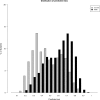Genetic Variants Associated with Colorectal Adenoma Susceptibility
- PMID: 27078840
- PMCID: PMC4831735
- DOI: 10.1371/journal.pone.0153084
Genetic Variants Associated with Colorectal Adenoma Susceptibility
Abstract
Background: Common low-penetrance genetic variants have been consistently associated with colorectal cancer risk.
Aim: To determine if these genetic variants are associated also with adenoma susceptibility and may improve selection of patients with increased risk for advanced adenomas and/or multiplicity (≥ 3 adenomas).
Methods: We selected 1,326 patients with increased risk for advanced adenomas and/or multiplicity and 1,252 controls with normal colonoscopy from population-based colorectal cancer screening programs. We conducted a case-control association study analyzing 30 colorectal cancer susceptibility variants in order to investigate the contribution of these variants to the development of subsequent advanced neoplasia and/or multiplicity.
Results: We found that 14 of the analyzed genetic variants showed a statistically significant association with advanced adenomas and/or multiplicity: the probability of developing these lesions increased with the number of risk alleles reaching a 2.3-fold risk increment in individuals with ≥ 17 risk alleles.
Conclusions: Nearly half of the genetic variants associated with colorectal cancer risk are also related to advanced adenoma and/or multiplicity predisposition. Assessing the number of risk alleles in individuals within colorectal cancer screening programs may help to identify better a subgroup with increased risk for advanced neoplasia and/or multiplicity in the general population.
Conflict of interest statement
Figures


References
-
- Neugut AI, Jacobson JS, Rella VA. Prevalence and incidence of colorectal adenomas and cancer in asymptomatic persons. Gastrointest Endosc Clin N Am. 1997;7:387–99. - PubMed
-
- Winawer SJ, Zauber AG, Fletcher RH, Stillman JS, O'brien MJ, Levin B, et al. Guidelines for colonoscopy surveillance after polypectomy: a consensus update by the US Multi-Society Task Force on Colorectal Cancer and the American Cancer Society. Gastroenterology. 2006;130:1872–85. - PubMed
-
- Levin B, Lieberman DA, McFarland B, Andrews KS, Brooks D, Bond J, et al. Screening and surveillance for the early detection of colorectal cancer and adenomatous polyps. 2008: a joint guideline from the American Cancer Society, the US Multi-Society Task Force on Colorectal Cancer, and the American College of Radiology. Gastroenterology. 2008;134:1570–95. 10.1053/j.gastro.2008.02.002 - DOI - PubMed
Publication types
MeSH terms
LinkOut - more resources
Full Text Sources
Other Literature Sources
Medical

